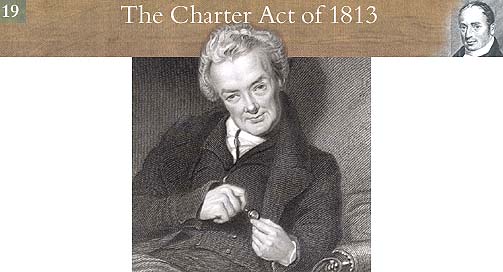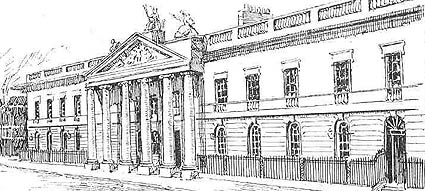
In 1813, the Charter granted to the East India Company in 1793 was about to expire, and the whole question of East India Company policy was to be brought before Parliament. It was 20 years since the House of Commons had locked the door of India against the introduction of Christian and secular knowledge and handed the key to the Court of Directors of the East India Company. During this period the Court had resisted every attempt to unlock it.
Carey and his colleagues pleaded with Fuller not to allow this golden opportunity to pass without a vigourous effort to obtain legal permission for missionaries to proceed directly to India, and to reside, and to itinerate without molestation. Fuller printed a statement of the Serampore Mission and translations, and sent a copy to every member of Parliament likely to take an interest in the question.
The great bulk of Anglo-Indians, the majority of the Court of Directors, the periodical press, and according to William Wilberforce, nine tenths of the members of the House of Commons, were opposed to the introduction of the Gospel to India.
Fuller obtained an interview with Lord Buckinghamshire, President of the Board of Control. He explained to him the wishes of the Baptist Missionary Society - liberty of access and legal toleration when there. With regard to the first point, Lord Buckinghamshire said 'he would see if they could be accommodated' and regarding the second, asked him to put his arguments in writing. The other missionary societies were also on the alert, and the Church Missionary Society, the London Missionary Society, and the Methodist Missionary Society all brought their influence to bear.
A different impression was given by the leader of the House of Commons, Lord Castlereagh, when Fuller met him. He was responsible for the management of the Bill in the Commons, and indicated that there was no disposition to grant any but the most limited concessions. He felt there was no support in the country for India missions. This clarified in Fuller's mind the future course of action. No concessions would be granted without the compulsion of public opinion behind them. Fuller communicated this to the other missionary bodies, and it was agreed to hold themselves ready to pour in petitions.
The Bill came before the House. Lord Castlereagh proposed the establishment of a Bishop and 3 archdeacons to superintend the chaplains of the different settlements, but this measure was intended solely for the Europeans in India.

India House, the Leadenhall Street headquarters of the East India Company. Courtesy 'The Centre for the Study of the Life and Work of William Carey D.D., 1761 - 1834.'
If it had not been for the fact that the East India Company was unhappy with the concessions to merchants and manufacturers, the Bill would have proceeded rapidly through the House. They requested permission to present evidence at the Bar of the House, and this was agreed to. There was a general feeling among Members of Parliament that they needed more information about India.
The Directors stated they would need 6 days to present their evidence. In fact it took 8 weeks. This gave time for public opinion to be roused and brought to bear on Parliament. William Wilberforce was the presence behind this movement, for he considered the object 'the greatest which men ever pursued'. He threw his whole soul into it with as much ardour and animation as he had done with the question of the Slave Trade. By the time the evidence was completed the voice of the country had become irresistible.
In a letter to Serampore, Fuller writes: 'Lord Castlereagh's declaration to leave the missionary question in the hands of the Court of Directors operated like an electric shock through the country, and united all the friends of missions in a determination to petition the House of Commons without delay. Churchmen, Methodists, Dissenters, and almost every party in Scotland were all alive and pouring such a flood of petitions as was scarcely ever seen. For 8 or 10 weeks the legislature was overwhelmed with them.'
The evidence of the East India Company terminated on the 27th May, 1813. During the 8 weeks it had taken, the table of the House of Commons was covered with petitions on the subject of Indian Missions. They streamed in, night after night, from all parts of the kingdom, from large public bodies and individual congregations, from influential towns and retired hamlets, and from Christians of every denomination, demanding, with a unanimous voice that India should be opened to the Gospel by an express provision in the Bill then before Parliament. They amounted to 900, a greater number than had appeared on any former occasion. The wishes of the constituencies produced a salutory impression on the House. William Wilberforce writes in his diary 'Lord Buckinghamshire acceded to our terms, and on the following day Lord Castlereagh agreed to Lord Buckinghamshire's, and to an arrangement for Christianising resolutions far surpassing my expectations.'
The debate on the great question was brought before the Committee of the House of Commons on 22nd June. William Wilberforce rose and made that magnificent speech in support of the missionary cause which produced so powerful an effect at the time. It was a speech which even one who opposed his missionary views stated that 'he spoke for three hours, but nobody seemed fatigued; all indeed were pleased, some with the ingenious artifices of manner, but most with the glowing language of the heart.' He closed his speech with a high enconium on the Serampore missionaries:
'In truth, Sir, these Anabaptist missionaries, as, among other low epithets bestowed on them, they have been contemptuously termed, are entitled to our highest respect and admiration. One of them, Dr. Carey, was originally in one of the lowest stations of society, but under all the disadvantages of such a situation, he had the genius, as well as benevolence to devise the plan that has been pursued of forming a society for communicating the blessings of Christian light to the natives of India, and his first care was to qualify himself to act a distinguished part in that truly noble enterprise. He resolutely applied himself to the diligent study of the learned languages; after making a considerable proficiency in them, he applied himself to several of the Oriental tongues, more especially to that which I understand is regarded as the parent of them all, the Sanscrit; in which last his proficiency is acknowledged to be greater than that of Sir W. Jones himself, or any other European. Of several of these languages, he has already published grammars, of one or two of them a dictionary, and he has in contemplation still greater enterprises. All this time, Sir, he is labouring indefatigably, as a missionary, with a warmth of zeal only equalled by that with which he prosecutes his literary labours. Another of these Anabaptist missionaries, Mr. Marshman, has established a seminary for the cultivation of the Chinese language, which he has studied with a success scarcely inferior to that of Dr. Carey in the Sanscrit. It is a merit of a more vulgar sort, but to those who are blind to their moral and even their literary excellencies, it may perhaps afford an estimate of value better suited to their principles and habits of calculation, that these men, and Mr. Ward also, another of the missionaries, acquiring from £1,000 to £1,500 per annum each, by the various exercise of their talents, throw the whole into the common stock of the Mission, which they thus support by their contributions only less effectually than by their researches and labours of a higher order. Such, Sir, are the exertions, such the merits, such the success of these great and good men, for I shall not hesitate to term them.'
The resolution for the admission of missionaries was adopted at 3 in the morning by a majority of 89 to 36 on the first reading. The Charter Act passed the 3rd reading on 3rd July, 1813, and put an end to the hostility of the Government of India to the cause of missions.